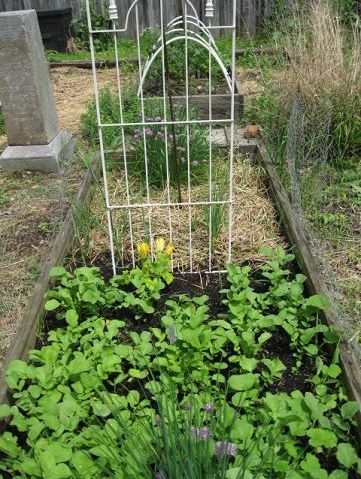Keeping up the garden for food... and a place to relax
Perhaps it is the very idea of growing your own food or maybe you simply enjoy the outdoors. We all have different reasons why we garden and most of them have something to do with taste. Vegetables, herbs and fruits grown in a home garden simply taste better.
Studies show homegrown food is more nutritious and that can only be a good thing, but its the taste that keeps dirt under our fingernails all summer long without a second thought.
Gardening is hard work and once you have committed to tending one it is not something you want to let fall by the wayside. An untended garden becomes unruly in no time and will only create a situation that requires even more work.
The soil is amended, the plants are in and
now what? A healthy garden needs three things to stay healthy and productive.
Water
This part of gardening sounds easy enough but it can be tricky. Most of us water too little or too much. There is a secret to providing the amount that is suitable for most plants found in a common home garden; the rain gauge. Im sure youve seen them at garden centers or nurseries. Some are simple and others are kind of cute with a little frog sticking his tongue out or something. Buy one.
Place your sprinkler in the garden and turn it on. See how long it takes for the rain gauge to fill 1/4 inch. This will determine the length of time you should water the garden.
The home garden needs about one inch of water a week. It is best to water three days a week rather than all at once. If it takes 15 minutes for your rain gauge to reach 1/4 inch you should water the garden about an hour a week or 20 minutes a day over the course of three days. Water as early in the day as possible. If it rains you can skip a day.
Fertilizer
If your garden is thriving there is little reason to add any fertilizer to your soil. If your garden soil is lacking in the proper nutrients your plants will let you know by not growing, dropping leaves, producing no food and worst case scenario, dying.
Plants need three macronutrients; nitrogen, phosphorous and potassium. When you see the letters NPK on a fertilizer package, they represent these three macronutrients. The K stands for kalium, which is the Latin name for potassium.
Plants need a little iron and zinc as well. Visual characteristics for deficiencies differ so if you are not sure about the soil, have it tested.
You can choose synthetic or organic fertilizer for use in the garden. Just remember, when overused, all fertilizers can contaminate the watershed. Follow package directions exactly as written for the safest way to use the product.
Mulch
Mulch looks good. It cleans everything up. It creates lines. It is so much more than a decorative solution in the garden. Mulch discourages weeds from growing, it enriches the soil with organic matter as it breaks down, it retains moisture and it provides protection.
A two or three inch layer of mulch is all you need. If you use too much mulch it will impede water filtration and drainage. If you use too little it will wash away in heavy rain.
Consider the work it takes to grow a successful garden a labor of love and enjoy every triumph. Learn from experience and one day you can call yourself a seasoned gardener.

